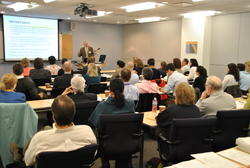
Inside the Kellerman classroom of the McGaw Pavilion, educators from Northwestern University Feinberg School of Medicine found themselves with pens rather than laser pointers. Sitting alongside peers from other Chicago-area medical centers, the group was part of the first-ever curriculum development symposium hosted by the Feinberg Academy of Medical Educators (FAME).
The two-day series of events held May 2 to 3 centered on the development of teaching methods, and included workshops, brown-bag lectures, and personal consultations. Led by David Kern, MD, MPH, professor at Johns Hopkins University School of Medicine, and Patricia Thomas, MD, associate dean for curriculum at Johns Hopkins, the symposium was also meant to provide a forum for communication.
“We often find that educators can be isolated, and this symposium is not only bringing educators at Feinberg together, it’s bringing educators from other campuses together as well,” Kern said. “The event creates skill development, networking, and expanded vision so that people can leave with a different view of what their role is going to be.”
Authors of Curriculum Development for Medical Education: A Six-Step Approach, the foremost textbook on the subject, Kern and Thomas were brought to campus to discuss some of their own experiences with curriculum renewal.
“I think it was good to hear a success story, especially when you are trying to do something similar yourself,” said Christine Stock, MD, Department of Anesthesiology chair. “For me, one of the most interesting parts was hearing about different evaluation methods.”
As Feinberg enters the implementation and evaluation of curriculum renewal this August, Thomas, who is credited as the architect of the Genes to Society (GTS) curriculum at Johns Hopkins, delivered a noontime lecture on May 2 that discussed some of the obstacles and accomplishments the university has experienced over the past three years. GTS, implemented in August 2009, is aimed at reframing the context of health and illness more broadly, to encourage students to explore the biologic properties of a patient’s health within a larger, integrated system.
“Curriculum developers are constantly required to do assessments of teaching and learning,” she said. “We did not anticipate the effect of the new curriculum on graduate students and how they might integrate into the new program, nor did we realize that by adding clinical skills into the afternoons of first-year students, they might become burned out.”
Established to foster health professionals in their development as educators, FAME orchestrated the symposium in response to the idea that although faculty plan vital educational experiences, they frequently have little or no training in the realm of curriculum development and delivery.
Targeted at medical educators, the symposium was meant to provide an understanding of the six steps of curriculum development, the importance of congruence among them, and how these principles can enhance educational program development.
“The event was a great way for faculty to learn about creating specific and clear learning objectives and deciding on the appropriate educational venue and evaluation method, while facilitating deep learning in an efficient manner,” said Jon Lomasney, MD, associate professor of pathology and director of FAME. “The curriculum is the foundation of everything we do as educators. It should address the needs of the learners and society, providing students with a framework to obtain understanding and the competencies necessary to provide outstanding healthcare in today’s complex and challenging environment.”






